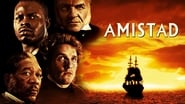Edith Hobbart
Beautifully told, it also made me go back to History books to double check or to confirm. That's what good movies also do, they provoke you into wanting to know more. I loved Djimon Hounsou - a sensational film presence and his soulfulness permeates the whole journey. Anthony Hopkins is a remarkable John Quincy Adams. The great Steven Spielberg doesn't shy away from the horrors and some of it is truly harrowing but even then the preciousness of the image protects you from excesses. I don't know if that is a flaw or just a grand commercial concession. I couldn't help trying to imagine, this story even the same script in the hands of an Arthur Penn for instance. After all of that, let me say I enjoyed it, I was moved and I will see it again.
TheLittleSongbird
'Amistad' is not one of Steven Spielberg's best, in the way that 'Schindler's List', 'Jaws', 'ET' and 'Raiders of the Lost Ark' are. He has however done worse, with the likes of 'The Lost World' and '1941'. Instead it's around solid middle when it comes to his films.Starting with the positives, the best things are the production values, coupled with the handsome and evocative period detail and the rich, searing cinematography there are some really arresting images here, and the sensational debut of Dijimon Hounsou, a performance of blistering passion and grave sensitivity.Throughout, especially in the first three-quarters, 'Amistad' boasts moments that are harrowing (the brutal voyage of the slaves), powerful (the opening scene) and moving (most of the film). The script is well-intentioned and thoughtful, if sometimes a bit over-sentimental and heavy-handed (especially Adams' big speech, that could have been stirring but didn't seem to know how far to go to make its obvious point, so it felt preachy). Much of Spielberg's direction is impeccable, with enough of what makes his direction so great in his best films.Hounsou isn't the only great actor here. Anthony Hopkins gives his all in an authoritative and stirring account of Adams and Matthew McConaughey shows more engagement and charisma than he does in some of his later films. Morgan Freeman is underused but is as you expect.On the other hand, 'Amistad' is a long film (not a bad thing necessarily), but could have been about 20 minutes shorter with less characters and some of the final act being trimmed. Some of the latter part of the film drags, and the score disappointingly is over-emphatic and gives a heavy-handedness. Despite being brilliantly delivered by Hopkins and clearly written with thought and good intent Adams' big speech just went too far making its point.In conclusion, a brave attempt at bringing a significant, if not as well known, event to film that works very well in a lot of elements but just misses the mark of completely working as an overall film. 7/10 Bethany Cox
kim_lieu
The Amistad is a slow-paced film for reasons of mature and ominous suspense in court-law. In 1839 Martin Van Buren was president and he is known as a figurehead of the upstart of the Democratic Party. Anthony Hopkins plays the former president John Quincy Adams having came down from office during 1837 as his final seating as American president. Hopkins is given an 11 minute defense during courtroom debate for the slaves who are well as the heroes of the historical triumph the movie commemorates. March 4, 1837 was the date when he was succeeded by Van Buren. By 1840, depression conglomerated with southern financial and political pressures pelted the president. But Buren was ready for re-election as the third party presidential candidate by his stern alliance for the Free Soil anti-slavery party. The movie centers on a slave ship, the Amistad. It is intercepted by the American Marine Naval, belonging controversially to Spain, America, or noting that all these events transpires before the Civil War, perhaps the quasi- legal slaves will have a legal bounty to gain ownership over La Amistad? The film does not alarm a subconscious racially perverted conceit in me, but instead one must suspend modernity to interpellate with white antiquated mentality. The neutral American bias for rightful ownership of the ship obviously wins my heart's favor for the captors of the ship, the slaves, because they hold more moral sway as the ones who own the ship just by being likened to cargo, which is closer to being originally accidental in the Amistad having moved them from their homeland Africa. Cinque, who is played by Djimon Hounsou, was the leader of this African revolt; desires and expresses his desire to go back to Africa. He leads the transatlantic slave ship. Critics will utmost agree that he shines outstandingly out of all the film's characters, and he is truly impacting emotion in good acting of indignation: never is he seen as brutal in the mature audience. The slave manages to seem believable in a survivor's right after a gruesome scene wherein the rest of the slaves on board were planked and died careening overboard, known historically poignant as Spielberg's "cargo dumping historical realism". The testimony of the two slaves that overtake the Amistad as to their desire to return to Africa sets the whole tone of their role as the protagonists. Morgan Freeman plays the free black man Theodore Joadson to give us an idea of cultural shift during the time of the abolitionists' gaining legal presence. He works in the news printing office in Boston. The film extras are made out to be, through alliteration and synecdoche of their disposable placid lack for talent, pointing towards the audience to focus on the main characters, especially the stand-out, Cinque. Stellan Skarsgaard acts as another vying cause for abolitionism as Lewis Tappan. Matthew McConaughey as attorney Roger Baldwin is hired by abolitionists specifically for his slave- friendly property lawyer status. Janusz Kaminski is the photographer who does Sepia ambiances for the film to heavy the mood in the same way a photographer of realist-journalist competence would choose for the morose-colored eyeglasses. The movie's meaning is that Civil War could have ensued from the slave's legal right becoming pronounced as a real threat to the southern slave beliefs.
cryak
Now I'm not really one for history. Never really was. But when I had first learned about the Amistad I was intrigued. I loved the idea of a group of slaves finally doing something about their captors on the ship (And on top of that Morgan Freeman starred in the film so you know I had to see it). The Film itself was extremely accurate to the actual event. It felt like I was actually watching a part in history before there were cameras or anything like that. My favorite scene in the film had to be when Cinque was having a flashback to what happened and how he came to America. From what I've learned in school, the treatment of slaves was accurately displayed however I was quite surprised when they threw the slaves overboard. Spielberg showed what happened if slaves got sick, if there were too many slaves on board, and the process and suffering the slaves went through. Throughout the film, before the translator came in, I found the African Americans extremely comical. The lawyers desperately tried to communicate with the Africans to save their lives and the Africans are just standing there thinking they're idiots. Their lines were comical and the whites had no clue what was going on. Overall, I thought the film was fantastic and I highly recommend it to anyone interested in history, slavery, or just want to watch a good movie.






